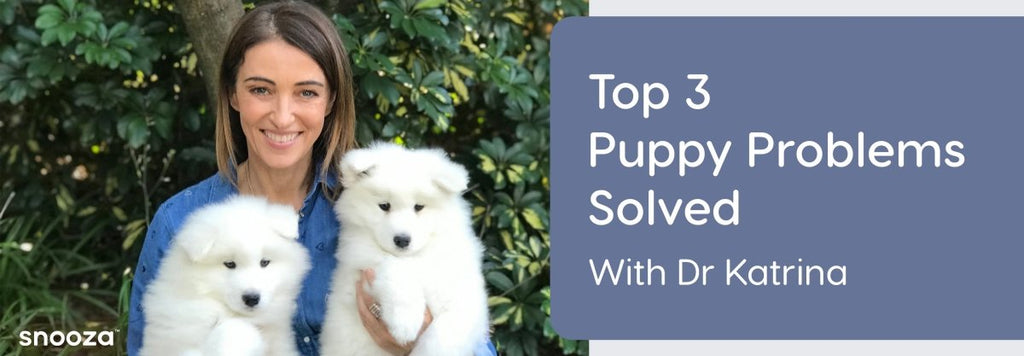Everyone loves a puppy - they are adorable and highly entertaining with their cute antics. They also keep their owners very busy with toilet training, learning the house rules, socialising, general training and getting into mischief.
Most people who raise a puppy will experience toileting accidents, precious items being chewed and destroyed, and pain from razor-sharp puppy teeth when they target your hand. These are all normal puppy behaviours but can be frustrating and downright challenging.
Here are some tips to help manage the top 3 most common puppy concerns.

1. Chewing
It's no surprise that chewing is one of the biggest complaints reported by owners. All puppies chew, but once you understand that it is a natural behaviour that is relatively short-lived, you can manage it and set up good puppy chew habits from the start.
Puppies chew to relieve themselves of the discomfort they're feeling while they are teething, plus it's also a way for them to explore the vast world around them. You must provide them with safe items to chew and redirect them to chew those instead of your shoes and furniture.
Using appropriate confinement, such as a crate or playpen, will keep them out of mischief and your treasured possessions safe. Always place them into their confined area with something safe to chew on so that it becomes a happy place where they learn to go to chew.
Only let your puppy roam free in your house or garden if they are closely supervised. If you are not actively watching them, pop them into their pet or crate with a safe item to chew.
2. Biting
Puppies explore their environment with their mouths, and play-biting is another normal behaviour that needs to be managed properly. Puppy teeth are sharp and can do some damage.
If your puppy bites you:
- Don't react to biting; simply stop interacting with your puppy and walk away, so they learn it is 'game over'
- Don't yell or smack your puppy
- Don't try to play with the puppy while they are biting you (it will confuse them)
- Redirect them to play with a toy.
Moving forward, try to avoid giving your puppy opportunities to bite - when they start getting excited, redirect them to play with their toy or pull some treats out and do a short training session, rewarding them for calm non-bitey behaviour.
Remember that puppy biting is normal. It's something that all puppies go through as they learn to play with each other and interact with humans, and they will grow out quickly once they learn this behaviour will not be rewarded.
3. Toilet Training
Toilet training a puppy can be frustrating - just when you think they have mastered it, they have another accident. But this is all normal, and different puppies will learn at different speeds.
You can start toilet training your puppy the moment you bring them home - you need to be patient and consistent; you can do a few simple things to make this process as simple as possible. You want to set them up to win and avoid allowing them to have an accident.
Remember -
- A young puppy has a small bladder capacity, so you must offer frequent opportunities to go outside.
- Your puppy will usually want to go to the toilet when they wake up and straight after a meal, so be ready to take them straight outside. Place your puppy where you want them to toilet, wait for them to go and then praise them and reward them with treats.
- Some signs indicate your puppy is about to go - they will often sniff the ground and turn in circles. When you catch them doing this, take them straight outside.
- Make sure you allow them the opportunity to go to the toilet before going to bed at night.
One of puppy owners' biggest mistakes is letting their puppy roam free in the house unattended. This allows them to have accidents. If you leave your puppy alone, wake them up first and take them outside to eliminate. Then confine them in a playpen or crate.
Introduce a command like "wee-wee's" and say this every time you put your pup down to eliminate. They will start associating this word with the action, which will be very useful later when you want your puppy to go to the toilet on command - eg. if you are travelling or visiting someone and want to be sure he has eliminated first.
If your pup has an accident, don't punish them or rub their nose in it as this may make them scared of you. Just clean up the mess and start again. Be patient!
By Dr Katrina Warren

